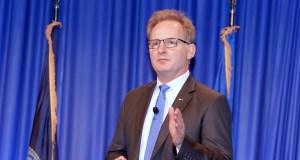Experts: New education secretary should expand personalized learning initiatives
Education Secretary Arne Duncan talks with Ja-Von Proctor, 18, a student at Cardozo Education Campus, about the app he created. Duncan announced last week he is stepping down in December. (Corinne Lestch/FedScoop)
Educational technology experts are closely watching to see whether Secretary Arne Duncan’s successor will continue his trademark policies – or shift focus to other priorities with just over a year left in office.
Acting Education Secretary John King, New York’s former education commissioner, was perhaps most widely known for overseeing the implementation of new, more rigorous Common Core standards and linking teacher evaluations to test scores. He became a senior adviser to Duncan in December after resigning from the state post.
King inherits a department that saw an expansion of the Future Ready schools program, a push to make broadband more accessible to low-income students, a rollout of a national educational technology plan and an embrace of digital tools in classrooms that trickled down from President Barack Obama.
“Arne Duncan was so focused on improving educational opportunity, that the introduction or expansion or deeper thinking of how technology could support those ideals was an increasingly easy conversation,” Karen Cator, who was Duncan’s director of the Office of Educational Technology from 2009 to 2013, told FedScoop in an interview.
“I would like to see a continued recognition that technology can support the broad goals, but technology isn’t, in of itself, the answer,” said Cator, who is now the head of Digital Promise, a nonprofit based in Washington, D.C. “But technology in support of higher standards, powerful teachers and deeper curriculum — those are the things that I think government can continue to do.”

John King was named the acting Secretary of Education by President Barack Obama.
As state education commissioner, King also benefited from some of Duncan’s signature programs, notably the Race to the Top and Investing in Innovation grant competitions, which encourages schools to think outside of the box in terms of personalized and competency-based models of learning.
Susan Patrick, president of the International Association for K-12 Online Learning, applauded King for his vision in New York – and appointing an Open Educational Resources Fellow to make publicly-funded digital instructional materials openly available across Big Apple schools and districts.
He also “helped advance competency-based educational approaches to expand educational opportunities using online and blended learning,” Patrick wrote in an email. “When districts asked for flexibility from seat-time restrictions to offer teacher-led online courses, King helped develop regulations to support anytime, anyplace learning through regulations to support digital learning options.”
Others weren’t as optimistic that King would be able to hit the ground running and put his imprint upon the administration as Duncan, one of Obama’s longest-serving cabinet members, did.
“You’re looking at someone who is coming in with a year left of the administration,” said Michael Horn, executive director of the Clayton Christensen Institute, a nonprofit that champions online learning. “There’s not a heck of a lot [King] can do. I don’t know if the timing lines up in his favor.”
Horn also criticized Duncan for not pushing for Congress to reauthorize the Elementary and Secondary Education Act, which rermains in limbo. Still, he added, Duncan was able to spotlight innovative learning models on a national stage.
“I think Duncan did a good job of raising the specter of personalized learning and the potential for technology to transform our schools,” he said. “I would like to see King continue to push and not just talk about it in terms of technology … but a real vision for blended learning and what it can do to transform schools.”
Duncan spent a fair amount of time in D.C.’s public schools because of their proximity and convenience, touting various programs and promoting an innovative app-building challenge at a local high school.
“As secretary, he cast a bright light on D.C. Public Schools by frequently visiting our schools and highlighting us as the fastest improving urban school district in the nation,” DCPS Chancellor Kaya Henderson said in a statement. “During his tenure he elevated the voices of students who are often forgotten, especially young men of color. I am proud to have called him my secretary of education.”
Duncan announced his resignation on Friday, fighting back tears as he spoke about his tenure under Obama, whom he followed from Chicago. He will officially step down in December.
Duncan’s boss gave him a laudatory send-off, saying he “has done more to bring our educational system – sometimes kicking and screaming – into the 21st century more than anybody else.”
Reach the reporter at corinne.lestch@fedscoop.com or follow her on Twitter @clestch.






